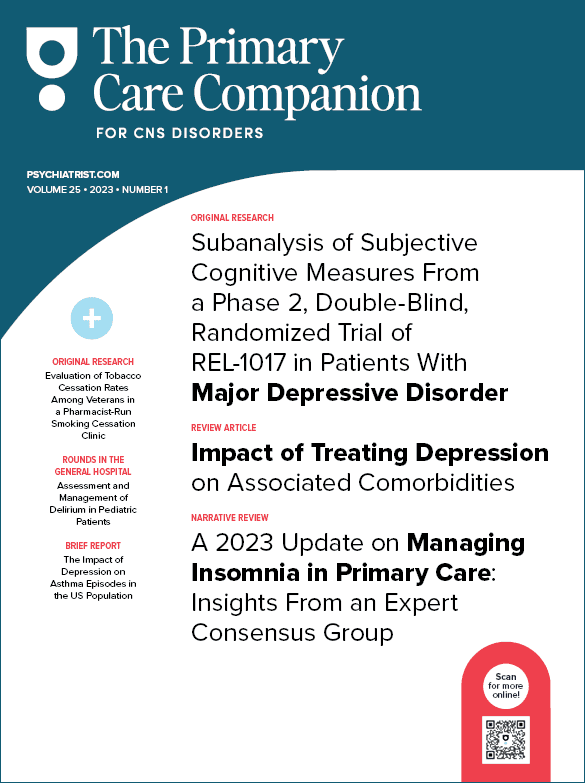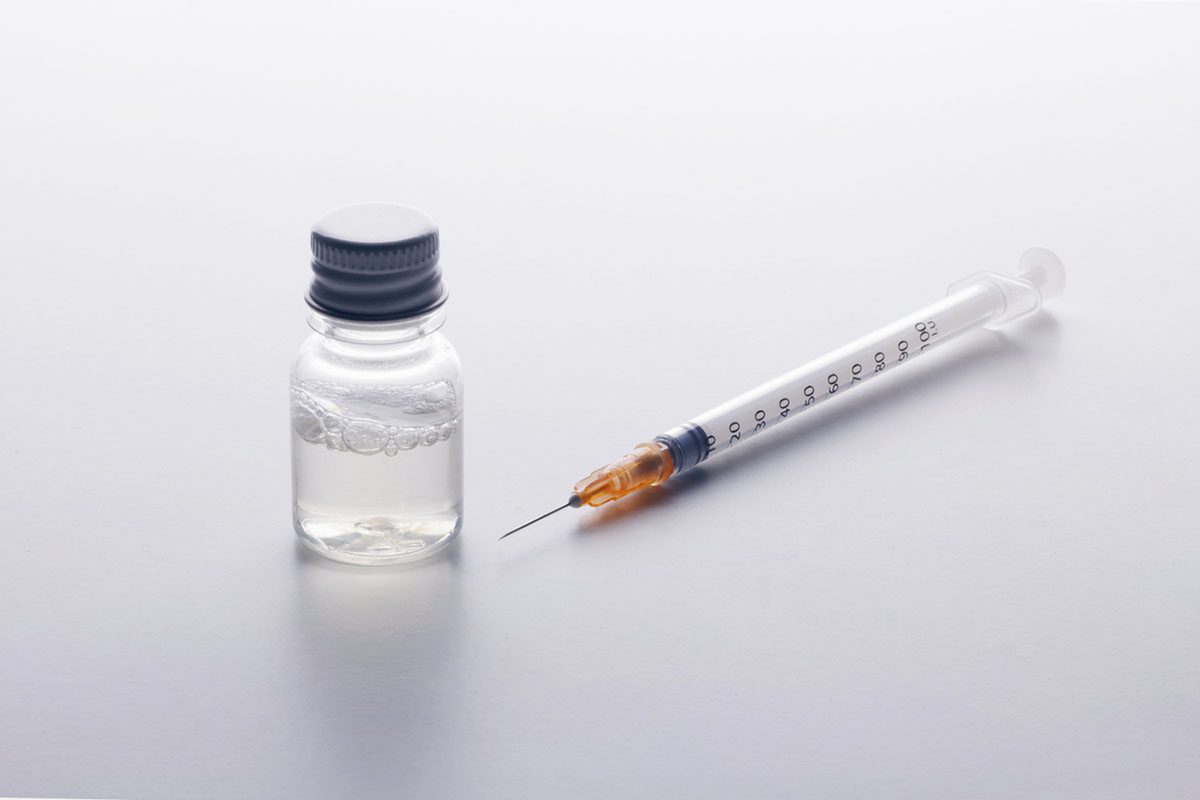Because this piece does not have an abstract, we have provided for your benefit the first 3 sentences of the full text.
To the Editor: The atypical antipsychotic clozapine is the most effective medication for treatment-resistant schizophrenia and schizoaffective disorder, improving psychopathology and quality of life; however, its use is limited by the risk of neutropenia (2.7%) and agranulocytosis (0.9%). In France, after initiation of clozapine, blood monitoring must occur on a weekly basis for the first 4 months, after which patients undergo monthly monitoring.
Lithium carbonate is known to increase the white blood cell (WBC) count by a mechanism that is still unclear but that may involve demargination, stimulation of granulocyte-macrophage colony-stimulating factor, and stimulation of cytokines.
Long-Term Treatment of Clozapine-Induced Leukopenia With Lithium: Fast-Onset Agranulocytosis Following Lithium Discontinuation
To the Editor: The atypical antipsychotic clozapine is the most effective medication for treatment-resistant schizophrenia and schizoaffective disorder, improving psychopathology and quality of life1; however, its use is limited by the risk of neutropenia (2.7%) and agranulocytosis (0.9%).2 In France, after initiation of clozapine, blood monitoring must occur on a weekly basis for the first 4 months, after which patients undergo monthly monitoring.
Lithium carbonate is known to increase the white blood cell (WBC) count by a mechanism that is still unclear but that may involve demargination, stimulation of granulocyte-macrophage colony-stimulating factor, and stimulation of cytokines.3,4 Clinicians have suggested using lithium carbonate in clozapine-induced neutropenia.1,3
We present here the case of a patient who benefited from clozapine rechallenge in the presence of lithium carbonate for 14 months, before lithium neurotoxicity led to a discontinuation of lithium.
Case report. Ms A is a 42-year-old maghrebian woman who was diagnosed with schizoaffective disorder (DSM-IV-TR) at the age of 29 years. This patient experienced mood lability and mental automatism with command hallucinations leading her to self-harm and violence against her relatives and caregivers. Her schizoaffective disorder was resistant to adequate trials of lithium, olanzapine, risperidone, amisulpride, and a combination of valproate and an antipsychotic. She was started on clozapine (to 600 mg daily). Within 2 months, hallucinations and violent behavior decreased dramatically. Twenty months after initiation of clozapine, her WBC count dropped to 2.87 ×— 109/L and neutrophil count fell to 1.37 ×— 109/L. Consequently, clozapine was stopped. The patient was then treated with a combination of valproate plus first-generation antipsychotics (haloperidol and zuclopenthixol) then valproate plus quetiapine. All were ineffective. It was decided to resume clozapine 1 year later due to increasing command hallucinations and more and more violent assaults toward patients and health professionals. A request for admission was sent to a special secure unit for dangerous patients. Her baseline WBC and neutrophil counts were in the normal range. Two months after clozapine reintroduction, the WBC and neutrophil counts fell below 3.5 ×— 109/L and 2 ×— 109/L, respectively. Lithium carbonate extended-release was then prescribed (to 800 mg daily). The WBC and neutrophil counts returned to normal range within 1 week. This combination was initially well tolerated. Improvement in psychopathology by the 2 following months enabled an end to the admission in the special secure unit, and Ms A was then hospitalized in a long-term unit specializing in socialization and rehabilitation. Fourteen months later, the patient started to experience incapacitating tremors. Although she had a plasma lithium level in the therapeutic range, tremors remained despite a decrease of the lithium dose, which was then discontinued. Two weeks later, the monthly blood monitoring showed that the WBC count had fallen to 2.35 ×— 109/L and the neutrophil count to 0.80 ×— 109/L; accordingly, clozapine was stopped. The WBC and neutrophil counts returned to normal range 2 weeks later.
The literature describing long-term use of lithium to treat clozapine-induced neutropenia is scarce. Reports of this combination have emphasized the adverse neurologic effects.5 Our patient benefited from a long-term lithium/clozapine combination for 14 months. Unfortunately, despite the initial good tolerance, lithium had to be stopped due to neurologic impairment, and blood dyscrasia occurred within 2 weeks. Our case underlines that clinicians must carefully weigh the risks and benefits of the lithium/clozapine combination and represents a warning against discontinuing lithium once the patient is stabilized: blood monitoring must occur weekly if lithium has to be discontinued.
References
1. Small JG, Klapper MH, Malloy FW, et al. Tolerability and efficacy of clozapine combined with lithium in schizophrenia and schizoaffective disorder. J Clin Psychopharmacol. 2003;23(3):223-228. PubMed doi:10.1097/01.jcp.0000084026.22282.5f
2. Lieberman JA. Maximizing clozapine therapy: managing side effects. J Clin Psychiatry. 1998;59(suppl 3):38-43. PubMed
3. Ghaznavi S, Nakic M, Rao P, et al. Rechallenging with clozapine following neutropenia: treatment options for refractory schizophrenia. Am J Psychiatry. 2008;165(7):813-818. PubMed doi:10.1176/appi.ajp.2008.07111823
4. Phiel CJ, Klein PS. Molecular targets of lithium action. Annu Rev Pharmacol Toxicol. 2001;41(1):789-813. PubMed doi:10.1146/annurev.pharmtox.41.1.789
5. Bender S, Linka T, Wolstein J, et al. Safety and efficacy of combined clozapine-lithium pharmacotherapy. Int J Neuropsychopharmacol. 2004;7(1):59-63. PubMed doi:10.1017/S1461145703003870
aCentre Hospitalier Spécialisé Valvert, Marseille, France
Potential conflicts of interest: None reported.
Funding/support: None reported.
Published online: January 21, 2016.
Prim Care Companion CNS Disord 2016;18(1):doi:10.4088/PCC.15l01841
© Copyright 2016 Physicians Postgraduate Press, Inc.
Enjoy free PDF downloads as part of your membership!
Save
Cite
Advertisement
GAM ID: sidebar-top




